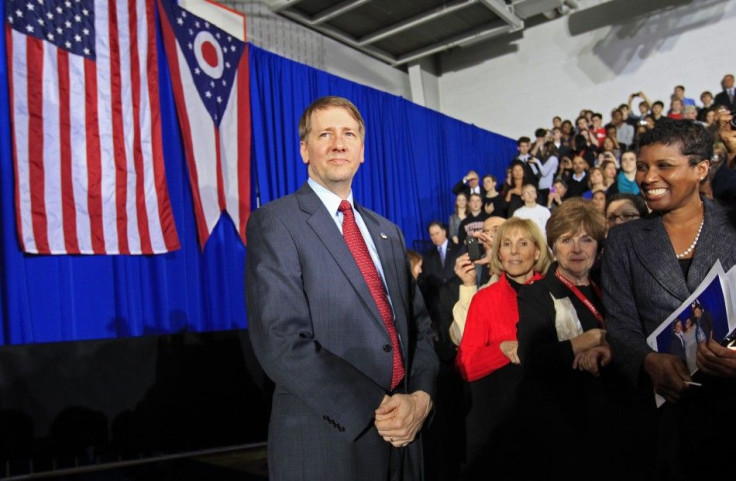Obama's Consumer Watchdog Appointment Could Pay Political Dividends
ANALYSIS

Republicans howled loudly Wednesday over President Barack Obama's decision to do a runaround on GOP obstruction of the new financial consumer protection agency by appointing Richard Cordray as its director while the Senate was not in session.
While Republicans are no fans of recess appointments (by Democratic presidents), much of the outrage centered on Obama's timing. Wednesday's appointment was made when the Senate was technically in a so-called pro-forma session, which would have prevented Obama from making recess appointments but does not entail any actual business.
The White House has characterized the appointment as a way to circumvent an unyielding Republican blockade preventing anyone to helm the Consumer Financial Protection Bureau. But Obama's decision to make the appointment on Wednesday during the pro forma session was--intentionally or not--a political move that could serve him well in his re-election campaign.
GOP Still Opposes Watchdog, Despite Wall Street Disaster
As the president's Republican critics bellow about constitutional minutiae concerning recess appointments, Obama will surely hammer the GOP for opposing a consumer financial agency after the worst financial crisis since the Great Depression.
"The only reason Republicans in the Senate have blocked Richard," Obama said in a Wednesday speech on the appointment, "is because they don't agree with the law that set up a consumer watchdog in the first place. They want to weaken the law. They want to water it down."
In the speech, he promised to use his authority to act unilaterally in America's best interest if Congress is unwilling to compromise with him. The appointment fits right into his campaign strategy of running against obstinant lawmakers, as Harry Truman did in 1948, railing against a "do-nothing, good-for-nothing" Congress.
Had Obama made his recess appointment in a less controversial manner--there was a brief window of opportunity Tuesday between the first and second sessions of the 112th Congress--Republicans would be harrumphing about the president's unwillingness to compromise on an agency they see as too powerful and too unaccountable.
So, what are his GOP critics saying instead?
Senate Minority Leader Mitch McConnell, R-Ky., said Cordray is facing "uncertain legal territory;" House Speaker John Boehner, R-Ohio, predicted the courts would find Obama's "extraordinary and entirely unprecedented power grab .. illegitimate."
That is not the message Senate Republicans have previously used to disparage the CFPB, which they have called a jobs-destroyer-in-waiting.
The louder they oppose the appointment for disrespecting the confirmation process, the longer the issue gets dragged out in the press through legal actions and constitutional challenges, the more grist Obama has in the campaign season to paint Republicans in Congress as too beholden to corporate interests.
In Obama's Wednesday speech, he linked a healthy and fair economy--the kind the U.S. needs to see in order for Obama to have a better shot at re-election--to ensuring that consumers are safe from financial scams that leave families and people in debt.
"That starts," Obama said, "with letting Richard do his job."
© Copyright IBTimes 2024. All rights reserved.











